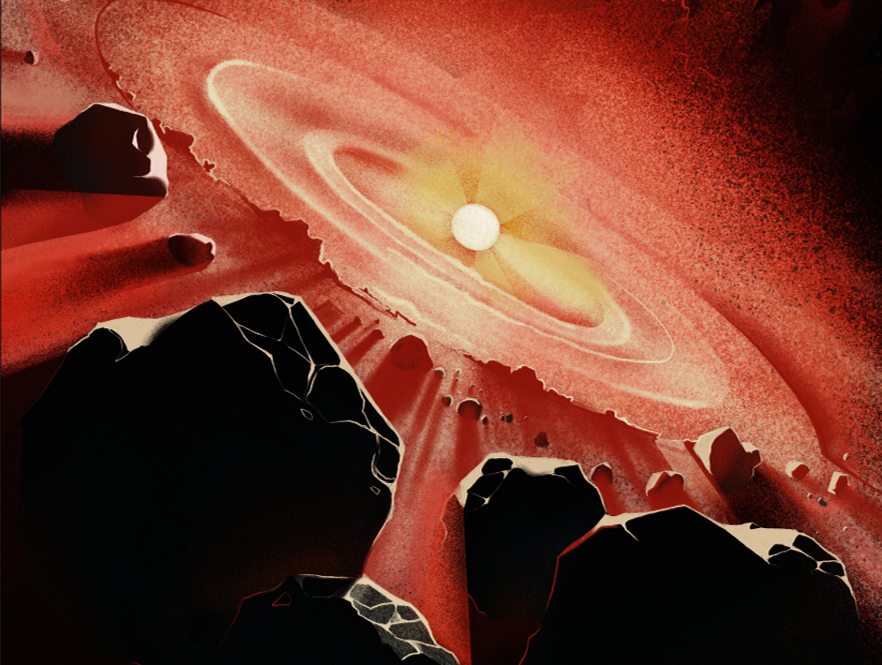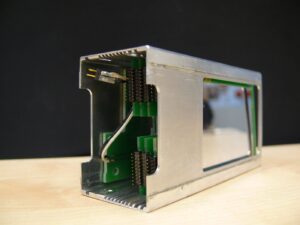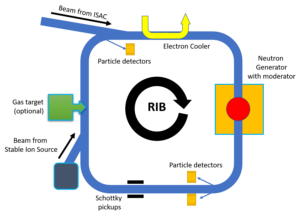
Exotic Decay Spectroscopy Group
overview
The Exotic Decay Spectroscopy Group investigates decay modes that occur only in very neutron-rich nuclei and in highly-charged ions with no or only a few electrons.
In Germany the ILIMA (Isomers, LIfetimes, and MAsses) collaboration operates several detectors in the existing storage rings at the GSI Helmholtz Center for Heavy Ion Research in Darmstadt and is building new devices for operation at the new radioactive-beam facility FAIR. The experimental setups that are presently used for our research are two multi-purpose particle detectors (CsISiPHOS [CsI–Silicon Particle detector for Heavy ions Orbiting in Storage rings] and PLEIADES [ParticLE sIlicon-scintillAtor DEtector for Storage rings]) which can be installed at the Experimental Storage Ring.
Between 2016-2021 the BRIKEN (Beta-delayed neutrons at RIKEN) collaboration has operated the worlds’ most efficient neutron detector array at RIKEN Nishina Center to measure half-lives and neutron-branching ratios of very short-lived nuclei at the border of the chart of nuclides.
Research feature

Extracting the timescale of the birth of the Sun
An international collaboration of scientists has succeeded in measuring the bound-state beta decay of fully-ionised thallium (thallium-205 81+) ions at the GSI Helmholtzzentrum für Schwerionenforschung, Darmstadt. The results have been published in the journal Nature. (Art: Danielle Adams)
Research Topics
The Exotic Decay Spectroscopy Group investigates decay modes that occur in very neutron-rich nuclei and in highly-charged ions with only a few electrons. Our research aims at a better understanding how elements heavier than iron are produced in the rapid neutron capture process in explosive stellar environments, as well as how stellar conditions influence various decay processes.

The two experimental setups that are presently used for our research are located at RIKEN Nishina Center in Wako, Japan and at the Experimental Storage Ring at the GSI Helmholtz Center for Heavy Ion Research in Darmstadt, Germany.
In Japan, the BRIKEN (Beta-delayed neutrons at RIKEN) collaboration operates the worlds’ most efficient neutron detector array to measure half-lives and neutron-branching ratios of very short-lived nuclei at the border of the chart of nuclides. In Germany, the ILIMA (Isomers, Lifetimes, and Masses) collaboration operates several detectors in the existing storage ring at GSI and is building new devices for operation at the new radioactive-beam facility FAIR.
On our home turf at TRIUMF the group is collaborating with the Accelerator Division on a feasibility study to couple a low-energy storage ring (TRISR) with a neutron generator to our existing ISAC radioactive beam facility. This worldwide unique facility would allow for the first time to perform direct measurements of neutron capture cross sections on short-lived isotopes.

Group Members
Research Scientists
Visitors
- Dr. Jan Glorius (MITACS Globalink Research Award), GSI Darmstadt: Aug- Oct 2022
test
Former Group Members (TRIUMF)
- Guy Leckenby (PhD student, UBC 2019-2024); now postdoc at the LP2i in Bordeaux, France
- Stephanie Ciccone (MSc University of Guelph, Sept. 2022-Sept 2024, co-supervision with Prof. Liliana Caballero and Dr. Nicole Vassh); now PhD student at the University of Guelph
- Cameron Shenton (MPhys Surrey/ UK, Feb – Dec 2023)
- Roger Caballero-Folch (Research Associate, 2015-2019, 2021-2023), now Radiation Physicist at TRIUMF
- Nicolas Tanzi (Int. Undergraduate Student, summer 2023); INP Phelma Grenoble, France
- Yukiya Saito (MSc 2018, PhD 2023 UBC; co-supervision with Prof. Reiner Kruecken); now NP3M Fellow (U of Notre Dame and Michigan State University)
- Madeleine Berube (Coop student fall/winter 2022/23); University of Waterloo
- Vanshika Sharma (Coop student summer 2022): University of British Columbia; now MSc student at the University College London
- Sarisha Das (MITACS Globalink Research Intern (GRI)): IIT Indore/ India
- Rikako Kono (UBC Visiting Int. Research Student (VIRS)): Tohoku University/ Japan; now PhD student at ANU Canberra, Australia
- Katelyn Watts (Coop student winter 2022): University of Waterloo
- Sophia Devinyak (Coop student fall 2021): University of Waterloo
- Paul Virally (Coop student fall 2021): University of Waterloo
- Grace Carpenter (Year Abroad 2019/20): University of Edinburgh/ UK
- Nikita Bernier (PhD 2018, UBC; co-supervision with Prof. Reiner Kruecken); now postdoc at University of Western Cape/ South Africa
- Daniel Yates (MSc 2019, UBC; co-supervision with Prof. Reiner Kruecken); now postdoc in the Gamma-Ray Group at TRIUMF
- Lewis Sexton (MPhys 2019, University of Surrey/UK); now postdoc at the University of Sheffield, UK
- Jack Mallinson (Year in Research 2017/18; University of York/ UK)
- Matt Foster (MPhys 2017, University of Surrey/UK)
- Chris Starling (MPhys 2015, University of Surrey/UK)
- Liliana Caballero (Research Associate 2015/16, TRIUMF/Guelph); now Associate professor at the University of Guelph
test
Former group members (GSI Darmstadt/University of Giessen)
- Fabio Schirru (Postdoc, GSI Darmstadt, 2013-2015); now Software Developer and Physicist at GSI Darmstadt
- Ali Mohammed Najafi (Postdoc, JLU Giessen/ TU Munich, 2013-2015); now in Design Engineer at ASML in Eindhoven/ NL
- Michele Marta (Postdoc, GSI Darmstadt, 2011-2014); now Head of Laboratory and Quality Assurance Engineer at Krick Messtechnik, Darmstadt/ Germany
- Alexey Evdokimov (PhD student, 2011-2014);
facilities
Outside of TRIUMF the Exotic Decay Spectroscopy Group has helped to build and operate two detection setups.
One of out detection setups is a neutron detector to measure beta-delayed neutrons. These are neutrons that are emitted after a beta-decay, and this decay mode occurs only for very neutron-rich nuclei. These measurements provide a new window into our stardust origins by making the first-ever decay measurements of many of the rare neutron-rich isotopes central to heavy element formation in stars.
The BELEN detector
The BELEN detector has been operated at GSI Darmstadt in 2010/11, before a measurement campaign was done in Finland at the IGISOL facility. In 2016 we have merged the setup with other neutron detectors and two HPGe clovers to form the BRIKEN (Beta-delayed Neutron Measurements at RIKEN) collaboration at RIKEN Nishina Center in Japan. The BRIKEN collaboration involves about 70 scientists and engineers from Japan, Canada, Spain, the United States, the United Kingdom, Hungary, Poland, Hong Kong, South Korea, and Vietnam.
The BRIKEN detector was the world’s most efficient neutron detector for astro- and nuclear physics. From 2016-2021, the collaboration investigated ~300 neutron-rich nuclides, measuring the neutron emission probabilities and half-lives for the many of them for the first time.
CsISiPHOS and PLEIADES
At the storage ring facilities at GSI Darmstadt and FAIR, a new generation of multi-purpose particle detectors for the detection of decay products outside of the ring acceptance have been developed. This research is done within the ILIMA project Isomeric beam, LIfetimes and MAsses. The prototype, called CsISiPHOS (CsI–Silicon Particle detector for Heavy ions Orbiting in Storage rings) and its younger brother PLEIADES (ParticLE sIlicon-scintillAtor DEtector for Storage rings) have been commissioned at the Experimental Storage Ring (ESR) in 2022. Two accepted proposals will make use of them in 2025/26.
publications
Publications Since 2016
- “High-temperature 205Tl decay clarifies 205Pb dating in early Solar System”, G. Leckenby, R.S. Sidhu, R.J. Chen, R. Mancino et al., Nature 635, 312 (2024) (open access link), Arxiv link
- “Bound-state beta decay of 205Tl81+ ions and the LOREX project”, R.S. Sidhu, G. Leckenby, R.J. Chen, R. Mancino et al., Phys. Rev. Lett. (accepted 2024)
- “Impact of newly measured β-delayed neutron emitters around 78Ni on light element nucleosynthesis in the neutrino-wind following a neutron star merger”, A. Tolosa-Delgado et al (The BRIKEN collaboration), subm. to Phys. Rev. Lett. (2024)
- “First measurement of the neutron-emission probability with a surrogate reaction in inverse kinematics at a heavy-ion storage ring”, M. Sguazzin, B. Jurado et al., Phys. Rev. Lett. (accepted, 2024), Arxiv link
- “First Exploration of Monopole-Driven Shell Evolution above the N = 126 shell closure: new Millisecond Isomers in 213Tl and 215Tl”, T.T. Yeung, A.I. Morales, et al., Phys. Rev. Lett. 133, 072501 (2024); Arxiv link
- “Measurement of the Isolated Nuclear Two-Photon Decay in 72Ge”, D. Freire-Fernandez, W. Korten, et al., Phys. Rev. Lett. 133, 022502 (2024); Arxiv link
- “Uncertainty Quantification of Mass Models using Ensemble Bayesian Model Averaging”, Yukiya Saito, Iris Dillmann, Reiner Kruecken, Matthew R. Mumpower, Rebecca Surman, Phys. Rev. C 109, 054301 (2024); Arxiv link.
- “β-delayed neutron emissions from N > 50 gallium isotopes”, R. Yokoyama et al., Phys. Rev. C108, 064307 (2023)
- “Storage, accumulation and deceleration of secondary beams for nuclear astrophysics”, J. Glorius, Y.A. Litvinov et al., Nucl. Instr. Meth. B541, 190 (2023).
- “Decay Spectroscopy of 160Eu: 5+ beta-decaying Isomer in 160Eu and Structure of K(pi)=4+ Band-heads in 160Gd”, D. Yates, R. Kruecken, I. Dillmann, P.E. Garrett, et al., Phys. Rev. C 107, 064309 (2023); Arxiv link
- “Measuring neutron capture cross sections of radioactive nuclei”, I. Dillmann, O. Kester, R. Baartman, et al., Europ. Phys. J. A 59, 105 (2023)
- “Analysis methods to determine the bound-state beta-decay half-life of Thallium-205”, Guy Leckenby,Ragandeep Singh Sidhu, Rui Jiu Chen, Yuri Litvinov, Jan Glorius, Christopher Griffin, Iris Dillmann and the E121 Collaboration, EPJ Web Conf. 279, 06010 (2023)
- “Measuring the beta-decay Properties of Neutron-rich Exotic Pm, Sm, Eu, and Gd Isotopes to Constrain the Nucleosynthesis Yields in the Rare-earth Region”, G.G. Kiss, A. Vitéz-Sveiczer, Y. Saito, A. Tarifeño-Saldivia, M. Pallas, J.L. Tain, I. Dillmann, et al., Astrophys.J. 936, 107 (2022)
- “Horizons: nuclear astrophysics in the 2020s and beyond”, H. Schatz et al., J. Phys. G 49, 110502 (2022)
- “First observation of isomeric states in 111Zr, 113Nb, and 115Mo”, J. Wu et al., Phys. Rev. C 106, 064328 (2022)
- “Beta-Delayed One and Two Neutron Emission Probabilities South-East of 132Sn and the Odd-Even Systematics in r-process Nuclide Abundances”, V.H. Phong et al., Phys. Rev. Lett. 129, 172701 (2022)
- “Development of a Reference Database for Beta-Delayed Neutron Emission”, P. Dimitriou, I. Dillmann et al., Nucl. Data Sheets 173, 144 (2021)
- “Beta-delayed neutron emission of r-process nuclei at the N=82 shell closure”, O. Hall et al. (BRIKEN Collaboration), Phys. Lett. B 816, 136222 (2021)
- “Decay Spectroscopy of 129Cd”, Y. Saito, I. Dillmann, et al., Physical Review C 102, 024337 (2020); Open access link: arxiv.org
- “Compilation and Evaluation of Beta-Delayed Neutron Emission Probabilities and Half-Lives for Z > 28 Precursors”, J. Liang et al., Nucl. Data Sheets 168, 1 (2020)
- “Strong one-neutron emission from two-neutron unbound states in beta decays of the r-process nuclei 86,87Ga”, R. Yokoyama et al., Phys. Rev. C. 100, 031302(R) (2019)
- “r-process nucleosynthesis: Connecting rare-isotope beam facilities with the cosmos”, C.J. Horowitz, A. Arcones, B, Cote, I. Dillmann, et al., J. Phys. G: Nucl. Part. Phys 46, 083001 (2019)
- “Presolar Silicon Carbide Grains of Types Y and Z: Their Molybdenum Isotopic Compositions and Stellar Origins”, N. Liu et al., Astrophys. J. 881, 28 (2019)
- “Observation of a microsecond isomer in 134In(49)85: Proton-neutron coupling “southeast” of 132Sn(50)82“, V. Phong et al., Phys. Rev. C 100, 011302 (2019)
- “Commissioning of the BRIKEN detector for the measurement of very exotic beta-delayed neutron emitters”, A. Tolosa-Delgado et al., Nucl. Instr. Meth. A925, 133 (2019)
- “First determination of β-delayed multiple neutron emission beyond A = 100 through direct neutron measurement: The P2n value of 136Sb”, R. Caballero-Folch, I. Dillmann et al., Phys. Rev. C98, 034310 (2018)
- “CsI–Silicon Particle detector for Heavy ions Orbiting in Storage rings (CsISiPHOS)”, M.A. Najafi, I. Dillmannet al., Nucl. Instr. Meth. A836, 1 (2016)
Careers
For TRIUMF employment opportunities, please visit the Career Opportunities page.
contributions and support
Our research is funded by the Natural Sciences and Engineering Research Council of Canada (NSERC). Part of our equipment has been funded by the German Helmholtz Association via a Young Investigators Grant VH-NG 627.




